Joyce2018
On this page, you find all documents, package deals, and flashcards offered by seller joyce2018.
- 117
- 0
- 1
Community
- Followers
- Following
118 items
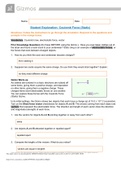
_Coulomb ForceSE Questions) Answered 2023
Name: Date: Student Exploration: Coulomb Force (Static) Directions: Follow the instructions to go through the simulation. Respond to the questions and prompts in the orange boxes. Vocabulary: Coulomb’s law, electrostatic force, vector Prior Knowledge Questions (Do these BEFORE using the Gizmo.). Have you ever taken clothes out of the dryer and found a sock stuck to your underwear? Static cling is an example of electrostatic forces, or the forces that exist between charged objects. 1. H...
- Exam (elaborations)
- • 6 pages •
Name: Date: Student Exploration: Coulomb Force (Static) Directions: Follow the instructions to go through the simulation. Respond to the questions and prompts in the orange boxes. Vocabulary: Coulomb’s law, electrostatic force, vector Prior Knowledge Questions (Do these BEFORE using the Gizmo.). Have you ever taken clothes out of the dryer and found a sock stuck to your underwear? Static cling is an example of electrostatic forces, or the forces that exist between charged objects. 1. H...
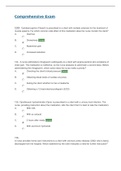
325868098-Hesi-exit-exam
133- Cyclobenzaprine (Flexeril) is prescribed to a client with multiple sclerosis for the treatment of muscle spasms. For which common side effect of this medication does the nurse monitor the client? A. Diarrhea B. Drowsiness Correct C. Abdominal pain D. Increased salivation 134 - A nurse administers nitroglycerin sublingually to a client with angina pectoris who complains of chest pain. The medication is ineffective, so the nurse prepares to administer a second dose. Before administeri...
- Exam (elaborations)
- • 46 pages •
133- Cyclobenzaprine (Flexeril) is prescribed to a client with multiple sclerosis for the treatment of muscle spasms. For which common side effect of this medication does the nurse monitor the client? A. Diarrhea B. Drowsiness Correct C. Abdominal pain D. Increased salivation 134 - A nurse administers nitroglycerin sublingually to a client with angina pectoris who complains of chest pain. The medication is ineffective, so the nurse prepares to administer a second dose. Before administeri...

Heart_Failure-SKINNY_Reasoning (1)
Part I: Recognizing RELEVANT Clinical Data History of Present Problem: JoAnn Smith is a 72-year-old woman who has a history of myocardial infarction (MI) four years ago and systolic heart failure secondary to ischemic cardiomyopathy with a current ejection fraction (EF) of only 15%. She presents to the emergency department (ED) for shortness of breath (SOB) the past three days. Her shortness of breath has progressed from SOB with activity to becoming SOB at rest. The last two nights she h...
- Case
- • 8 pages •
Part I: Recognizing RELEVANT Clinical Data History of Present Problem: JoAnn Smith is a 72-year-old woman who has a history of myocardial infarction (MI) four years ago and systolic heart failure secondary to ischemic cardiomyopathy with a current ejection fraction (EF) of only 15%. She presents to the emergency department (ED) for shortness of breath (SOB) the past three days. Her shortness of breath has progressed from SOB with activity to becoming SOB at rest. The last two nights she h...
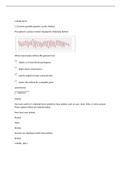
Nurs 211 Midterm Exam guide
1.0M4E N211 1.25 points possible (graded, results hidden) The patient’s cardiac monitor displays the following rhythm: Which intervention will the RN perform first? Obtain a 12-lead electrocardiogram. Begin chest compressions. Ask the patient to take a deep breath. Assess the patient for a palpable pulse. unanswered Submit You have used 0 of 1 attempt Some problems have options such as save, reset, hints, or show answer. These options follow the Submit button. Save Save your answer...
- Exam (elaborations)
- • 59 pages •
1.0M4E N211 1.25 points possible (graded, results hidden) The patient’s cardiac monitor displays the following rhythm: Which intervention will the RN perform first? Obtain a 12-lead electrocardiogram. Begin chest compressions. Ask the patient to take a deep breath. Assess the patient for a palpable pulse. unanswered Submit You have used 0 of 1 attempt Some problems have options such as save, reset, hints, or show answer. These options follow the Submit button. Save Save your answer...
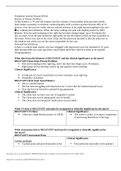
clinical_2.docx latest 2023
Peripheral Arterial Disease (PAD) History of Present Problem: JoAnn Smith is a 74-year-old woman who has a history of myocardial infarction and systolic heart failure secondary to ischemic cardiomyopathy with a current ejection fraction (EF) of 15 percent. Over the last two weeks she has noticed achiness in her right leg and tingling in her toes after walking short distances. When she stops walking, the pain and tingling resolve in 1 15 0 0 minutes. Now the pain/cramping in her right leg h...
- Case
- • 6 pages •
Peripheral Arterial Disease (PAD) History of Present Problem: JoAnn Smith is a 74-year-old woman who has a history of myocardial infarction and systolic heart failure secondary to ischemic cardiomyopathy with a current ejection fraction (EF) of 15 percent. Over the last two weeks she has noticed achiness in her right leg and tingling in her toes after walking short distances. When she stops walking, the pain and tingling resolve in 1 15 0 0 minutes. Now the pain/cramping in her right leg h...
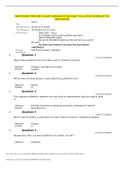
EDUC 750 Quiz 2 sc0red 100%
Question 1 3 out of 3 points Open ended questions are most often used in research involving: Selected Answer: complex concepts and a small sample. Question 2 3 out of 3 points Which level of measurement is also called the qualitative level? Selected Answer: Nomin al Question 3 3 out of 3 points The important difference between the ratio level of measurement and the interval level is: Selected Answer: the ratio level has an absolute zero point, whereas the interval...
- Exam (elaborations)
- • 4 pages •
Question 1 3 out of 3 points Open ended questions are most often used in research involving: Selected Answer: complex concepts and a small sample. Question 2 3 out of 3 points Which level of measurement is also called the qualitative level? Selected Answer: Nomin al Question 3 3 out of 3 points The important difference between the ratio level of measurement and the interval level is: Selected Answer: the ratio level has an absolute zero point, whereas the interval...
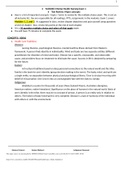
Mental Health - Exam 1 Study Guide 100%correct
CONCEPTS / IDEAS 1. Health Care Traditions Western: nursing theories, psychological theories, mental health & illness derived from Western framework. A person finds identity in individuality. Mind and body are two separate entities (different practitioners for disorders of mind and body). Disease has a specific, measurable, and observable cause, and providers focus on treatment to eliminate the cause. Success in life is obtained by preparing for the future. Eastern: rich cultural tradit...
- Other
- • 8 pages •
CONCEPTS / IDEAS 1. Health Care Traditions Western: nursing theories, psychological theories, mental health & illness derived from Western framework. A person finds identity in individuality. Mind and body are two separate entities (different practitioners for disorders of mind and body). Disease has a specific, measurable, and observable cause, and providers focus on treatment to eliminate the cause. Success in life is obtained by preparing for the future. Eastern: rich cultural tradit...
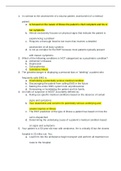
Module 3 Self Exam Questions And Answers 100% Correct
1. In contrast to the assessment of a trauma patient, assessment of a medical patient: a. Is focused on the nature of illness the patient’s chief complaint and his or her symptoms b. Almost exclusively focuses on physical signs that indicate the patient is experiencing a problem c. Requires a thorough head-to-toe exam that involves a detailed assessment of all body systems d. Is not as complex for the EMT because most patients typically present with classic symptoms 2. Which of the f...
- Exam (elaborations)
- • 16 pages •
1. In contrast to the assessment of a trauma patient, assessment of a medical patient: a. Is focused on the nature of illness the patient’s chief complaint and his or her symptoms b. Almost exclusively focuses on physical signs that indicate the patient is experiencing a problem c. Requires a thorough head-to-toe exam that involves a detailed assessment of all body systems d. Is not as complex for the EMT because most patients typically present with classic symptoms 2. Which of the f...
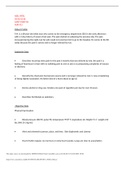
CASE STUDY #2 NUR 415
09/30/2018 CASE STUDY #2 NUR 415 Patient Profile F.M. is a 68-year-old white man who comes to the emergency department (ED) in the early afternoon with a 2-day history of severe chest pain. The pain started on wakening the previous day. The pain increased during the night, but his wife could not convince him to go to the hospital. He comes to the ED today because the pain is severe and no longer relieved by rest. Subjective Data • Describes recurring chest pain for the past 6 months t...
- Case
- • 3 pages •
09/30/2018 CASE STUDY #2 NUR 415 Patient Profile F.M. is a 68-year-old white man who comes to the emergency department (ED) in the early afternoon with a 2-day history of severe chest pain. The pain started on wakening the previous day. The pain increased during the night, but his wife could not convince him to go to the hospital. He comes to the ED today because the pain is severe and no longer relieved by rest. Subjective Data • Describes recurring chest pain for the past 6 months t...
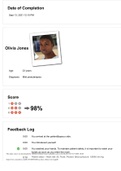
Olivia Jones v Sims Core Log latest 2023
Feedback Log 0:00 You arrived at the patient's side. 0:00 You introduced yourself. 0:05 You washed your hands. To maintain patient safety, it is important to wash your hands as soon as you enter the room. 0:10 Patient status - Heart rate: 85. Pulse: Present. Blood pressure: 158/96 mm Hg. This study source was downloaded by from CourseH on 02-06-2023 10:57:17 GMT -06:00 Respiration: 12. Conscious state: Appropriate. SpO2: 97%. Temp: 99 F (37 C). EFM: --. Fetal heart rate: --. ...
- Case
- • 7 pages •
Feedback Log 0:00 You arrived at the patient's side. 0:00 You introduced yourself. 0:05 You washed your hands. To maintain patient safety, it is important to wash your hands as soon as you enter the room. 0:10 Patient status - Heart rate: 85. Pulse: Present. Blood pressure: 158/96 mm Hg. This study source was downloaded by from CourseH on 02-06-2023 10:57:17 GMT -06:00 Respiration: 12. Conscious state: Appropriate. SpO2: 97%. Temp: 99 F (37 C). EFM: --. Fetal heart rate: --. ...
